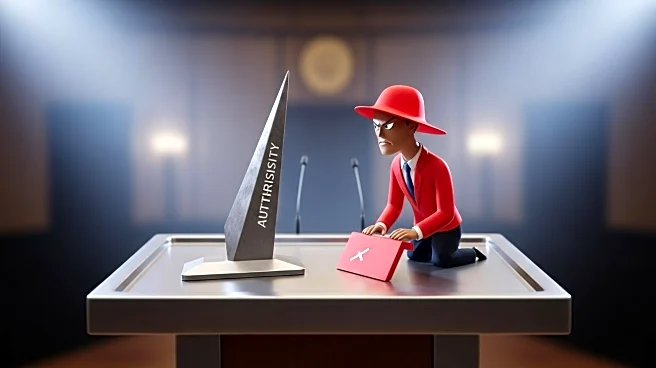What's Happening?
Dr. Demetre Daskalakis, a former official at the Centers for Disease Control and Prevention, has publicly criticized Senator Rand Paul for comments made about his personal lifestyle. Daskalakis, who recently resigned from the CDC’s National Center for Immunization and Respiratory Diseases, faced criticism from Paul, who questioned his suitability for government service based on his lifestyle choices. Paul, in an interview with The Hill, expressed opposition to infant vaccinations against hepatitis B and labeled Daskalakis as a major proponent of such measures. Daskalakis, a gay man and advocate for LGBTQ+ health, defended his record in public service, emphasizing his contributions to public health and outbreak management. He dismissed Paul's comments as irrelevant to his professional capabilities and highlighted the importance of science in public health.
Why It's Important?
The exchange between Dr. Daskalakis and Senator Paul underscores ongoing tensions in U.S. politics regarding personal lifestyle and professional qualifications. This incident highlights the challenges faced by LGBTQ+ individuals in public service, particularly when their personal lives are scrutinized by political figures. The broader implications include potential impacts on public health policy, especially concerning vaccination programs. Daskalakis' defense of his record emphasizes the importance of scientific expertise in health-related decision-making, which could influence public perception and policy debates. The controversy also reflects the polarized nature of political discourse in the U.S., where personal attacks can overshadow substantive policy discussions.
What's Next?
The public exchange may prompt further discussions on the role of personal lifestyle in evaluating public officials' qualifications. Stakeholders in public health and LGBTQ+ advocacy groups might respond to support Daskalakis and emphasize the importance of scientific credentials over personal lifestyle in public service roles. Additionally, this incident could influence future debates on vaccination policies, with potential implications for legislative actions and public health strategies. The ongoing dialogue may also affect how political figures approach personal attacks in public discourse, potentially leading to calls for more respectful and issue-focused discussions.









